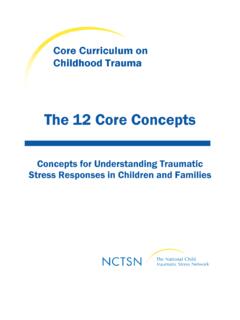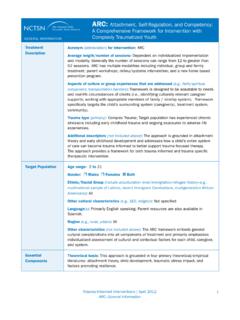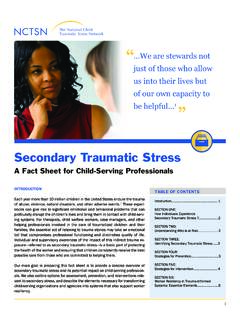Transcription of Information for Parents and Caregivers
1 Information for Parents and CaregiversSexual development and Behavior in ChildrenYour five-year-old daughter is playing in her room with a couple of friends. You hear a lot of giggling and squealing. When you open the door to check on the kids, you find them sitting on the floor with their panties off, pointing at and touching each other s genitals. What do you do?Every day, Parents around the world are faced with situations like this. Being caught off-guard by young children s self-exploration and curiosity about body parts and sexual issues is one of the uncomfortable realities of parenting, and can raise a host of troubling questions, such as, Is my child normal? Should I be worried? What should I say? Although talking with children about bodily changes and sexual matters may feel awkward, providing children with accurate, age-appropriate Information is one of the most important things Parents can do to make sure children grow up safe, healthy, and secure in their development and Behavior in Young Children: The Basics Like all forms of human development , sexual development begins at birth.
2 Sexual development includes not only the physical changes that occur as children grow, but also the sexual knowledge and beliefs they come to learn and the behaviors they show. Any given child s sexual knowledge and behavior is strongly influenced by:The child s age 1-3 What the child observes (including the sexual behaviors of family and friends)4 What the child is taught (including cultural and religious beliefs concerning sexuality and physical boundaries) Young people do not wake up on their thirteenth birthday, somehow transformed into a sexual being overnight. Even young children are sexual in some form. 5 Heather Coleman, PhD & Grant Charles, PhDUniversity of Calgary, Alberta, Canada and The University of British Columbia, Vancouver, partnership with:caringforK DS: Sexual development and Behavior in Children - Information for Parents & Caregivers April 2009 Very young and preschool-aged children (four or younger) are naturally immodest, and may display open and occasionally startling--curiosity about other people s bodies and bodily functions, such as touching women s breasts, or wanting to watch when grownups go to the bathroom.
3 Wanting to be naked (even if others are not) and showing or touching private parts while in public are also common in young children. They are curious about their own bodies and may quickly discover that touching certain body parts feels nice. (For more on what children typically do at this and other ages, see Table 1.) As children age and interact more with other children (approximately ages 4 6), they become more aware of the differences between boys and girls, and more social in their exploration. In addition to exploring their own bodies through touching or rubbing their private parts (masturbation), they may begin playing doctor and copying adult behaviors such as kissing and holding hands. As children become increasingly aware of the social rules governing sexual behavior and language (such as the importance of modesty or which words are considered naughty ), they may try to test these rules by using naughty words.
4 They may also ask more questions about sexual matters, such as where babies come from, and why boys and girls are physically different. (For more, see Table 1.)Table 1: Common Sexual Behaviors in Childhood1, 3, 6 AgeUncommon/Problematic BehaviorsPreschool children(less than 4 years)Exploring and touching private parts, in public and in private Rubbing private parts (with hand or against objects) Showing private parts to others Trying to touch mother s or other women s breasts Removing clothes and wanting to be naked Attempting to see other people when they are naked or undressing (such as in the bathroom)Asking questions about their own and others bodies and bodily functions Talking to children their own age about bodily functions such as poop and pee Young Children(approximately 4-6 years)Purposefully touching private parts (masturbation)
5 , occasionally in the presence of others Attempting to see other people when they are naked or undressing Mimicking dating behavior (such as kissing, or holding hands) Talking about private parts and using naughty words, even when they don t understand the meaningExploring private parts with children their own age (such as playing doctor , I ll show you mine if you show me yours, etc.)School-Aged Children(approximately 7-12 years)Purposefully touching private parts (masturbation), usually in private Playing games with children their own age that involve sexual behavior (such as truth or dare , playing family, or boyfriend/girlfriend )Attempting to see other people naked or undressing Looking at pictures of naked or partially naked people Viewing/listening to sexual content in media (television, movies, games, the Internet, music, etc.)
6 Wanting more privacy (for example, not wanting to undress in front of other people) and being reluctant to talk to adults about sexual issuesBeginnings of sexual attraction to/interest in peers 2 The National Child Traumatic Stress Network Once children enter grade school (approximately ages 7 12), their awareness of social rules increases and they become more modest and want more privacy, particularly around adults. Although self touch (masturbation) and sexual play continue, children at this age are likely to hide these activities from adults. Curiosity about adult sexual behavior increases particularly as puberty approaches and children may begin to seek out sexual content in television, movies, and printed material. Telling jokes and dirty stories is common.
7 Children approaching puberty are likely to start displaying romantic and sexual interest in their peers. (For more, see Table 1.)Although Parents often become concerned when a child shows sexual behavior, such as touching another child s private parts, these behaviors are not uncommon in developing children. Most sexual play is an expression of children s natural curiosity and should not be a cause for concern or alarm. In general, typical childhood sexual play and exploration: Occurs between children who play together regularly and know each other well Occurs between children of the same general age and physical size Is spontaneous and unplanned Is infrequent Is voluntary (the children agreed to the behavior, none of the involved children seem uncomfortable or upset)Is easily diverted when Parents tell children to stop and explain privacy rules Some childhood sexual behaviors indicate more than harmless curiosity, and are considered sexual behavior problems.
8 Sexual behavior problems may pose a risk to the safety and well-being of the child and other children. (For more on this topic, see the National Child Traumatic Stress Network s factsheet, Understanding and Coping with Sexual Behavior Problems in Children: Information for Parents and Caregivers at ) Sexual behavior problems include any act that:Is clearly beyond the child s developmental stage (for example, a three-year-old attempting to kiss an adult s genitals)Involves threats, force, or aggression Involves children of widely different ages or abilities (such as a 12-year-old playing doctor with a four-year-old)Provokes strong emotional reactions in the child such as anger or anxietyResponding to Sexual BehaviorsSituations like the one described at the beginning of this handout can be unsettling for Parents .
9 However, these situations also offer excellent opportunities to assess how much children understand and to teach important Information about sexual first step is to try to figure out what actually happened. To do this, it s important to stay calm. Staying calm will allow you to make clear decisions about what you say and/or do, rather than acting on strong emotions. 3caringforK DS: Sexual development and Behavior in Children - Information for Parents & Caregivers April 2009 Coping with Your Own Reactions To remain composed, try taking a long, deep breath, counting to ten, or even closing the door and stepping away for a couple of minutes before saying anything. In the case described above, a parent might calmly tell the children that it s time to get dressed and then ask each child to go to a different room in the house.
10 After taking a few moments to collect his or her thoughts and to consult with a spouse or partner if feeling very unsettled the parent could then talk to each child one-on-one. When talking to children about sexual behaviors, it s important to maintain a calm and even tone of voice and to ask open-ended questions as much as possible, so the children can tell what happened in their own words, rather than just answering yes or no. So, in this case, a parent might ask each child:What were you doing? How did you get the idea? How did you learn about this? How did you feel about doing it? In the opening scenario, all of the children involved were about the same age, had been playmates for some time, and seemed to be enjoying their game. So, it s likely the children were just curious and playing around and that no one was upset about what happened.



















